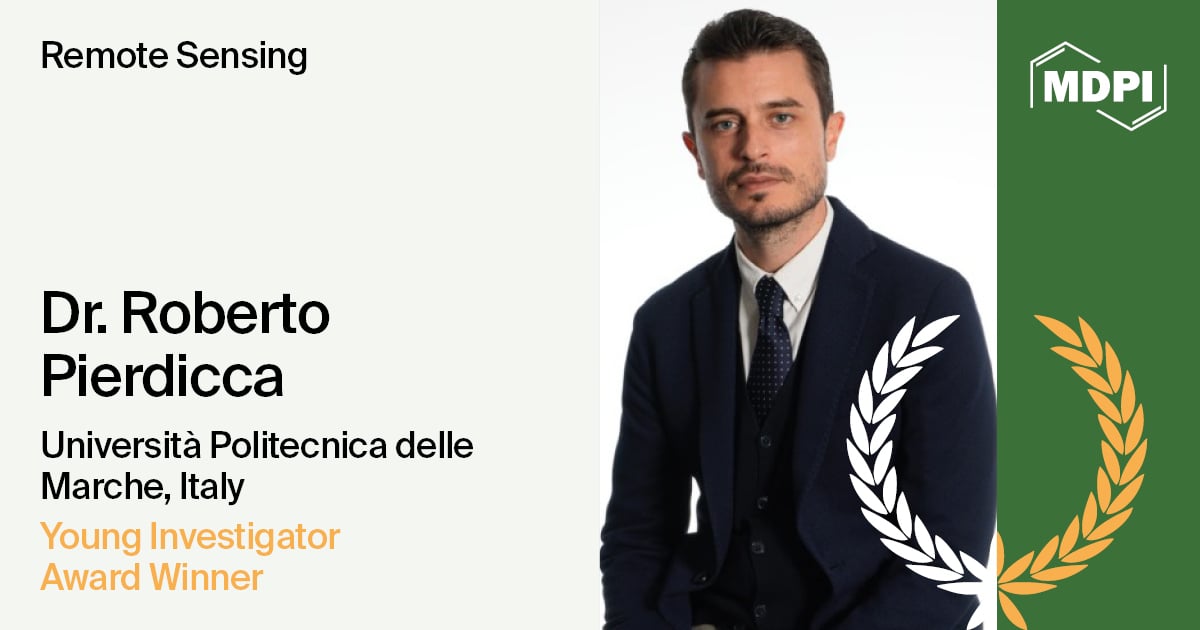
Journal Menu
► ▼ Journal Menu-
- Remote Sensing Home
- Aims & Scope
- Editorial Board
- Reviewer Board
- Topical Advisory Panel
- Photography Exhibition
- Instructions for Authors
- Special Issues
- Topics
- Sections & Collections
- Article Processing Charge
- Indexing & Archiving
- Editor’s Choice Articles
- Most Cited & Viewed
- Journal Statistics
- Journal History
- Journal Awards
- Society Collaborations
- Conferences
- Editorial Office
Journal Browser
► ▼ Journal BrowserNeed Help?
Announcements
30 July 2025
Interview with Dr. Roberto Pierdicca—Winner of the Remote Sensing Young Investigator Award

We are pleased to announce Dr. Roberto Pierdicca as the winner of the Remote Sensing 2025 Young Investigator Award. The Remote Sensing Young Investigator Award was established in 2018 to acknowledge the achievements of young investigators in the field of remote sensing. All winners were chosen by the journal’s award committee.
Name: Dr. Roberto Pierdicca
Affiliation: Università Politecnica delle Marche, Department of Civil, Building Engineering and Architecture (DICEA), Italy
Research interests: GeoAI; point cloud; cultural heritage; remote sensing
We were honored to interview Dr. Roberto Pierdicca and learn about his views and experiences in relation to scientific research and awards. The interview is summarized below:
The following is a short interview with Dr. Roberto Pierdicca:
1. Could you briefly introduce yourself and your current affiliation?
I’m Roberto Pierdicca, Associate Professor of Geomatics at the Università Politecnica delle Marche (Marche Ploytechnic University), Dipartimento di Ingegneria Civile Edile e dell’Architettura (DICEA)—Department of Civil, Building Engineering and Architecture.
2. Could you share your main current research interests, what inspired you to pursue a career in remote sensing, as well as your perspective on its future?
My research interests focus on GeoAI, new paradigms of geospatial data processing, and interpretation with the aid of Artificial Intelligence methods. Within such an interesting topic, I’m investigating Geospatial Reasoning and Spatial Intelligence systems to unveil the potential of reasoning systems under the complex umbrella of spatio-temporal dynamics in different fields and geo-data. Just to mention some, point clouds in cultural heritage, forestry, and environmental monitoring. I’m also interested in discovering the potential of new visualization systems based on eXtended Reality. I owe my passion for remote sensing to Prof. Fangi; his passion and dedication to photogrammetry shed light on my real inclination toward research and education. Ciao Gabriele.
3. Could you share your experiences of collaborating with the Remote Sensing journal?
From the very beginning of my career, I have had an active collaboration with Remote Sensing and other MDPI journals, mostly in the fields of applied science, GIS, and remote sensing. We have strengthened our collaboration with series collections, where I acted as a guest editor. I also served as a reviewer for several papers and contributed by publishing my research.
4. How do you see the future of remote sensing science, particularly in your area?
Remote sensing will be closer to computer vision and pattern recognition with the essential aid of AI. The availability of data from satellites with growing temporal, spatial, and spectral resolutions requires more complex approaches that, with human supervision, shall be able to merge more data to refine the interpretation of phenomena. Data imputation, multimodal systems, classification, and segmentation are part of our daily job as remote sensing researchers, and I expect a dialogue between these disciplines. More should be done in terms of validation, and we must strive to “speak the same language” as geoscientists, data scientists, and computer engineers.
5. Lastly, as the award winner, would you like to take a moment to share your thoughts with our readers?
Gratitude. Without the help of my research team and the support of colleagues and friends, I would never have reached this point. My suggestion to the new generation of researchers is to do difficult things—the easiest ones are the most trivial. Difficult things are tough sometimes, but they deserve to be pursued. And please, mind the use of AI; it is a fantastic tool, it can reduce the time to perform tasks, but the risk is to reduce your capacity for interpretation and creative thinking of solutions. “A fool with a tool is still a fool”.



